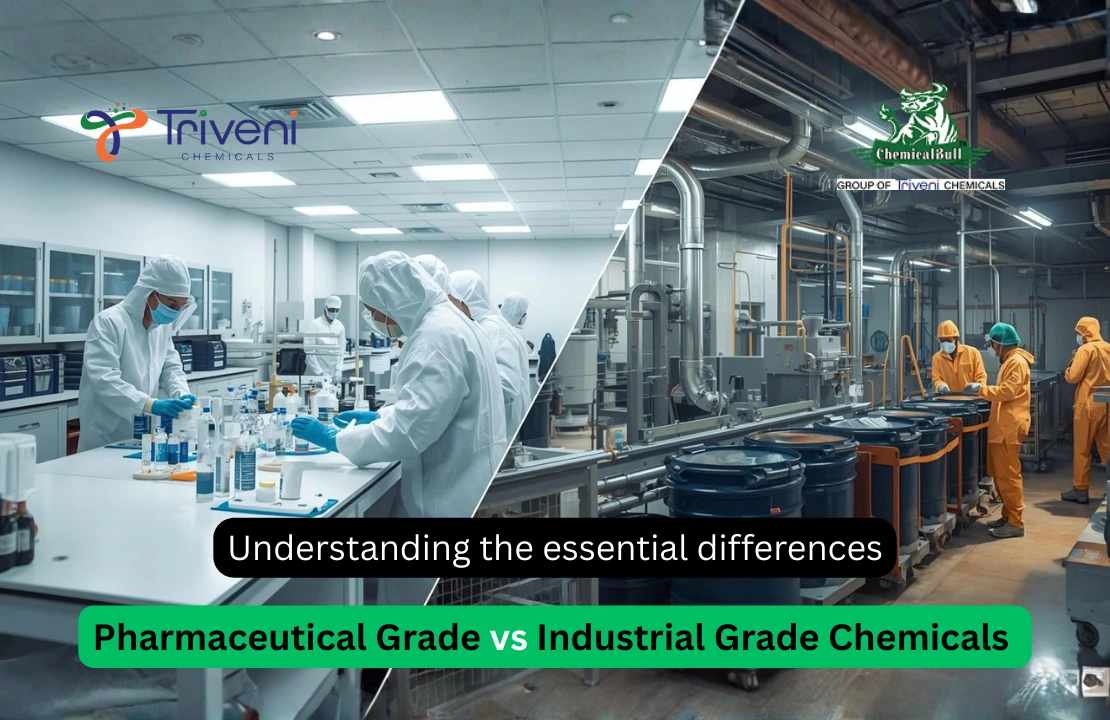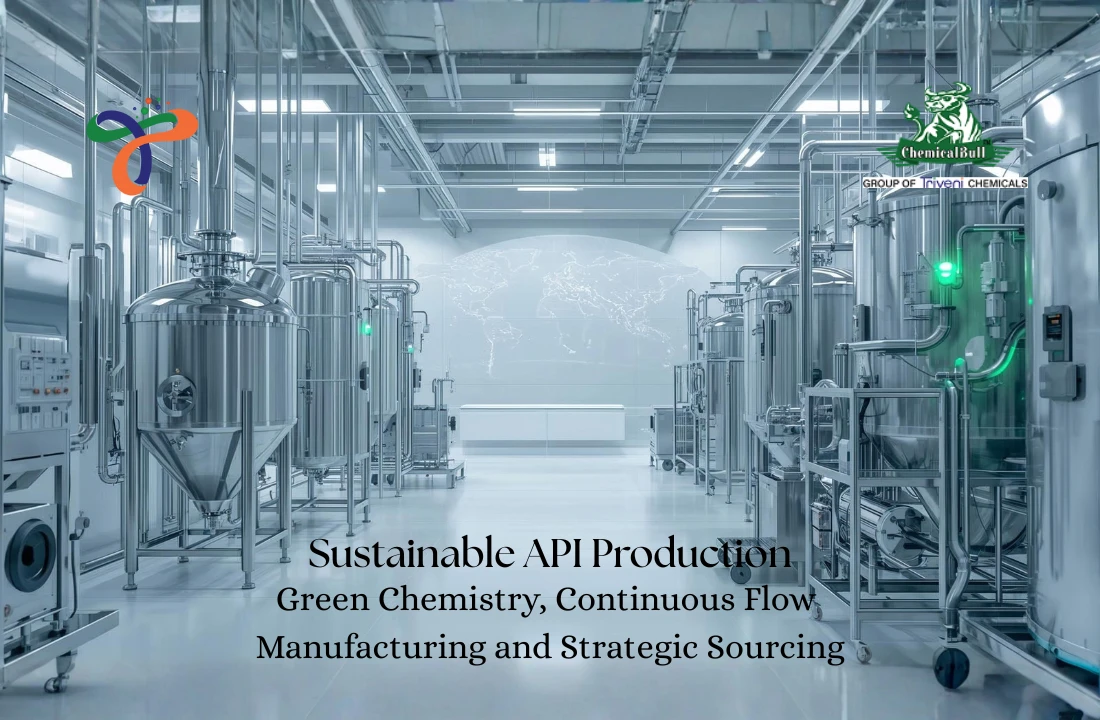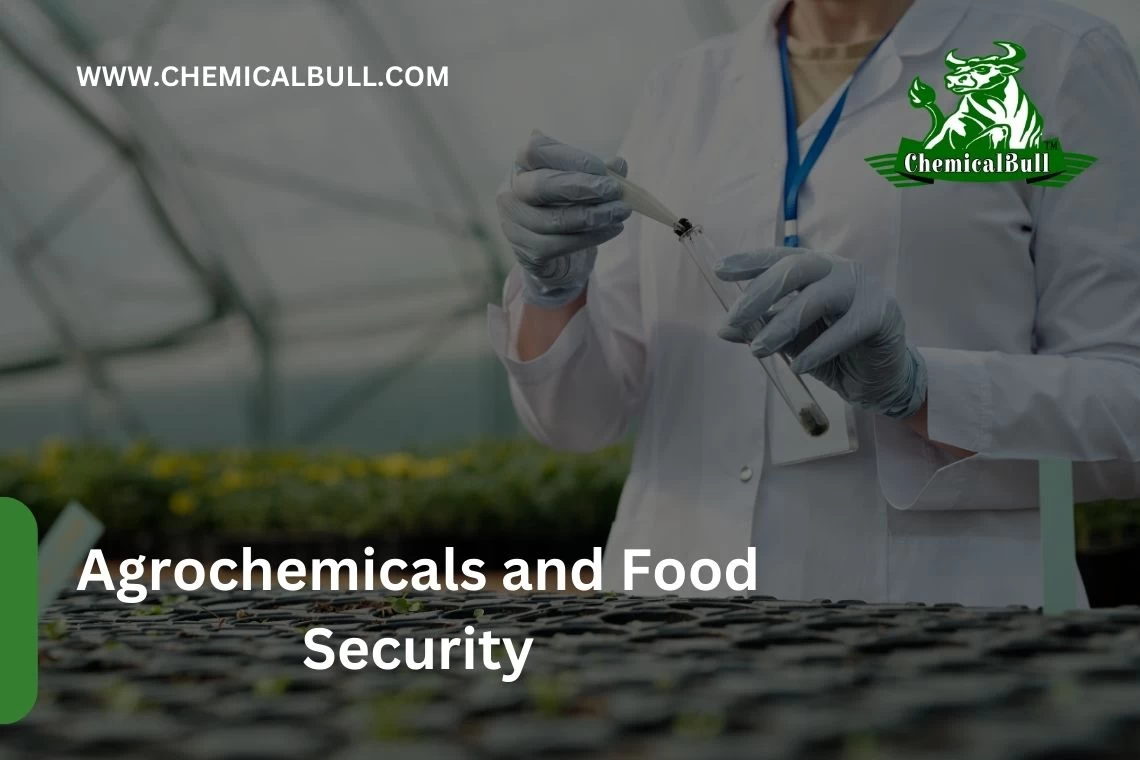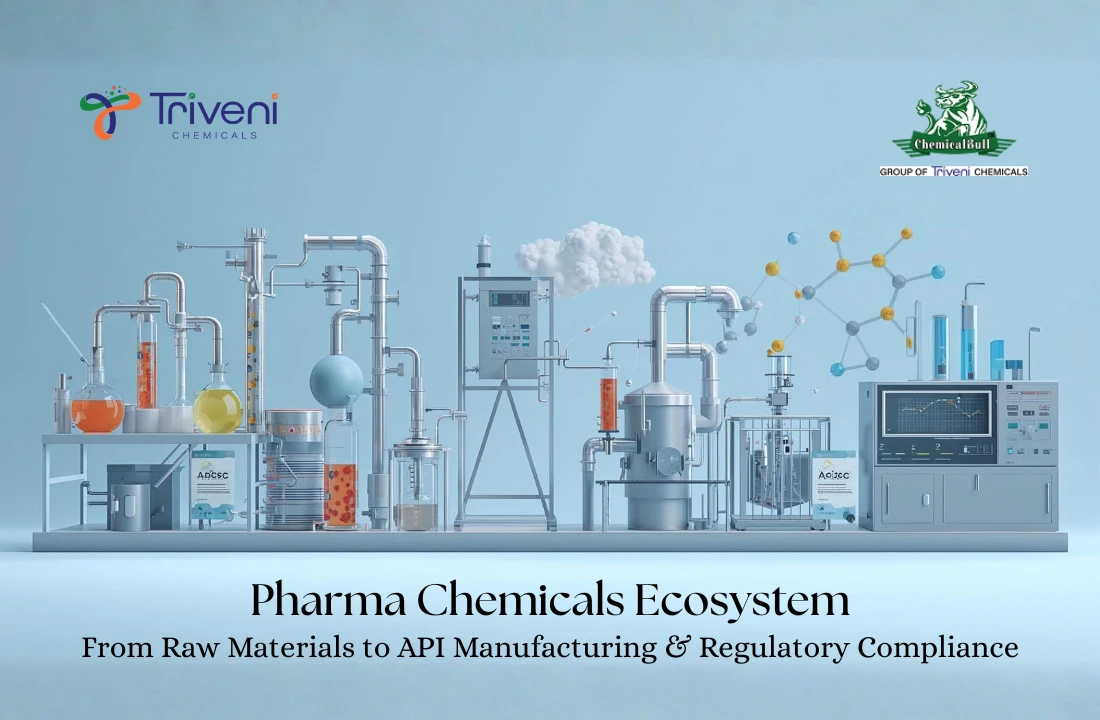Agrochemicals And Food Security: Addressing Global Challenges
Introduction
The connection between agrochemicals and food security is among the biggest issues confronting humans at present. As per the Food and Agriculture Organization (FAO), more than 733 million people around the world were suffering from hunger by 2023. With the projected global population to increase to nearly 10 billion in 2050, the need to grow more food using less land has never been more pressing.
Agrochemicals in agriculture — including fertilizers, pesticides, herbicides, and crop protection chemicals — have played a decisive role in the agricultural productivity gains of the past century.
The Green Revolution of the 1960s and 70s, fuelled largely with pesticides and fertilizers, stopped the spread of famine to many millions. However, today we are faced with the more complicated issue of how to harness the potential of agrochemicals and ensure the world's food security, all the while also addressing issues of health and environmental issues that arise from their usage.
This blog explores the role of agrochemicals in addressing global food security challenges, examines key products that support agricultural productivity and crop yield improvement, and outlines the sustainable agrochemicals and practices needed to build a food-secure future.
Explore our complete range of crop-ready agrochemical products — supporting farmers and agri-businesses worldwide with quality-assured solutions. If you want to know more about the agrochemicals so visit our complete Detailed blog: Agro Chemicals: Complete Guide to Agricultural Chemical Solutions for Modern Farming
Understanding Agrochemicals in Agriculture
Agrochemicals in agriculture are chemical substances specifically designed to improve crop yields, protect crops from pests, diseases, and weeds, and enhance soil and plant nutrition. They are the primary tools through which modern agriculture achieves the agricultural productivity levels needed to support global food security.
What Are the Main Types of Agrochemicals?
The role of agrochemicals is best understood by looking at what each category does for food production:
- Fertilizers — Supply essential nutrients (nitrogen, phosphorus, potassium) that boost crop yield improvement and soil fertility. Key examples include Calcium Nitrate and Calcium Cyanamide.
- Pesticides and Insecticides — Protect crops from destructive insects and pest populations that can devastate harvests. Pesticides and food security are directly linked — without pest control, global crop losses could exceed 40%.
- Herbicides in Agriculture — Control weeds that compete with crops for water, nutrients, and sunlight. Herbicides like Glyphosate and Trichlorphyr are among the most widely used crop protection chemicals globally.
- Fungicides — Prevent fungal diseases that cause significant post-harvest losses and reduce food availability.
- Plant Growth Regulators (PGRs) — Regulate plant development to improve fruit set, crop quality, and stress resilience.
- Biopesticides and Sustainable Agrochemicals — Derived from natural sources, offering effective crop protection with a lower environmental footprint.
Browse ChemicalBull's full portfolio of agrochemicals for agriculture — from fertilizers to crop protection chemicals and herbicides.
Key Agrochemical Products Supporting Global Food Security
Understanding specific agrochemical products helps farmers, agronomists, and food security professionals make informed choices about crop nutrition and protection. Here are seven essential agrochemical products that directly support agricultural productivity, food security, and agriculture:
Calcium Nitrate Fertilizer
Type: Water-soluble nitrogenous fertilizer containing calcium and nitrogen.
Key Use: Boosts crop yield improvement through fast nitrogen delivery and strengthened plant cell walls. Ideal for fertigation in vegetables, fruits, and cereals.
Calcium Nitrate fertilizer is one of the most important crop nutrition agrochemicals available to farmers. As a dual-nutrient fertilizer delivering both nitrogen and calcium, it drives rapid vegetative growth, improves fruit quality, and prevents calcium-deficiency disorders like blossom end rot in tomatoes and tip burn in lettuce. Its complete water solubility makes it the preferred choice for drip irrigation and foliar spray systems — enabling precise, efficient crop yield improvement with minimal waste.
Calcium Cyanamide Fertilizer
Type: Slow-release nitrogenous fertilizer with soil-conditioning properties.
Key Use: Provides nitrogen for crops, improves soil pH, suppresses soil-borne pests and weeds — a multifunctional sustainable agrochemical.
Calcium Cyanamide fertilizer is a unique agrochemical that combines the functions of a nitrogen fertilizer, soil conditioner, and mild pesticide in a single product. When applied to soil, it gradually hydrolyzes to release nitrogen in the ammonium form — feeding crops over an extended period while also suppressing certain soil-borne pathogens and weed germination. Its alkalizing effect also helps correct acidic soils, making it a valuable sustainable agrochemical for improving soil health and long-term agricultural productivity.
Chlorpyrifos — Broad-Spectrum Insecticide
Type: Organophosphate insecticide for control of soil and foliar insect pests.
Key Use: Controls a wide range of chewing and sucking insects on cereals, cotton, vegetables, and fruit crops — protecting yields and food supply.
Chlorpyrifos is a widely used organophosphate insecticide that plays a significant role in pesticides and food security by protecting high-value crops from major insect pests, including aphids, caterpillars, termites, and root-feeding grubs. As a crop protection chemical, it is used on a range of crops, including corn, soybeans, wheat, and vegetables, preventing yield losses that would otherwise threaten food availability and farmer livelihoods. Its use is subject to strict agrochemical regulation to minimize human and environmental exposure.
Para-Cymene — Natural Biopesticide Component
Type: Naturally occurring terpene with insecticidal and antimicrobial properties.
Key Use: Used in eco-friendly crop protection formulations — a key ingredient in sustainable agrochemicals and botanical pesticide development.
Para-Cymene represents the next generation of sustainable agrochemicals — a naturally derived terpene compound with proven insecticidal and antimicrobial activity against crop pests and plant pathogens. As the global agrochemical industry trends move toward biopesticides and reduced synthetic chemical use, Para-Cymene serves as a valuable active ingredient in botanically derived crop protection chemicals that meet both effectiveness and environmental sustainability standards.
Glyphosate — The World's Most Used Herbicide
Type: Broad-spectrum, non-selective systemic herbicide.
Key Use: Controls a wide range of annual and perennial weeds in agronomic crops, orchards, and non-crop areas — fundamental to modern crop protection and food security.
Glyphosate is one of the most significant herbicides in agriculture globally, directly contributing to food security and agriculture by eliminating competition from weeds that can reduce crop yields by 25–50% if left uncontrolled. As a systemic, non-selective herbicide, it works by blocking a key enzyme pathway in plants, effectively controlling over 150 weed species. Its use in conservation tillage and no-till farming systems also supports soil health by reducing erosion — aligning with sustainable agricultural productivity goals.
Trichlorphyr — Selective Woody Weed Herbicide
Type: Selective systemic herbicide for control of woody plants, shrubs, and broadleaf weeds.
Key Use: Clears invasive vegetation from farmland and pastures — protecting arable land availability and supporting agricultural productivity.
Trichlorphyr is a selective herbicide in agriculture used specifically for controlling woody weeds, brush, and invasive plant species that encroach on agricultural land and reduce its productivity. By clearing farmland of these persistent vegetation threats, Trichlorphyr helps expand and maintain the arable land base — a critical factor in long-term global food security issues, particularly in developing countries where land degradation is a major challenge.
Cinnamaldehyde — Natural Fungicide and Biopesticide
Type: Plant-derived aromatic aldehyde with antifungal and insecticidal properties.
Key Use: Used in organic and sustainable crop protection formulations — effective against fungal crop diseases and certain soil pests.
Cinnamaldehyde is a plant-derived sustainable agrochemical sourced from cinnamon bark oil, valued for its natural antifungal and insecticidal properties. As consumer and regulatory pressure drives demand for bio-based crop protection chemicals, Cinnamaldehyde is gaining prominence as an active ingredient in organic-approved fungicide and soil fumigant formulations. Its effectiveness against Fusarium, Pythium, and other fungal crop pathogens — combined with rapid biodegradation and low mammalian toxicity — makes it an ideal component of sustainable and integrated crop protection programs.
The Role of Agrochemicals in Global Food Security
The role of agrochemicals in achieving and maintaining global food security cannot be overstated. FAO food security data consistently shows that agricultural productivity gains enabled by agrochemicals have been central to reducing hunger rates in developing nations over the past five decades — even as the global population has more than doubled.
How Agrochemicals Drive Agricultural Productivity
• Fertilizers like Calcium Nitrate directly increase crop yield improvement by supplying nutrients that soils often cannot provide in sufficient quantities for modern high-yield crop varieties.
• Pesticides and food security are inseparably linked — the FAO estimates that without crop protection chemicals, global food production would fall by up to 40%, triggering widespread food insecurity.
• Herbicides in agriculture remove weed competition, allowing crops to use available water, nutrients, and sunlight to their full potential — directly translating into higher yields per hectare.
• Crop protection chemicals collectively allow a single farmer to manage much larger areas of land than was historically possible, enabling the economies of scale needed to feed growing urban populations.
Food Security in Developing Countries
Food security in developing countries faces a unique set of challenges. Smallholder farmers — who produce around 70% of the food consumed in developing nations — often lack access to quality agrochemicals, financial credit, and technical knowledge. Improving access to safe, affordable, and effective crop protection chemicals and fertilizers in these regions is one of the most powerful food security solutions available to policymakers and development organizations.
The FAO food security framework emphasizes that sustainable intensification — producing more food per unit of land through better agrochemical use, rather than expanding agricultural area into forests and ecosystems — is the most environmentally responsible path to food security and agriculture in the developing world.
Global Food Security Challenges From Agrochemical Use
While the contribution of agrochemicals to global food security is clear, their use comes with serious global food security challenges that must be honestly addressed. Understanding these challenges is the first step toward finding workable food security solutions.
Pesticide Resistance — A Growing Crisis
Continuous and improper use of the same crop protection chemicals over many seasons causes target pest and weed populations to develop resistance — making previously effective agrochemicals obsolete. Over 500 arthropod pest species and 250 weed species have developed documented resistance to pesticides and herbicides in agriculture. This resistance development is one of the most urgent global food security issues facing agronomists today.
Soil Degradation and Long-Term Productivity Loss
Over-reliance on synthetic fertilizers without complementary organic matter additions can deplete soil microbial diversity, reduce water-holding capacity, and lead to progressive soil acidification or salinization. Protecting soil health is essential for maintaining the long-term agricultural productivity needed to sustain food security and agriculture for future generations.
Water Contamination From Agrochemical Runoff
Improper application of herbicides in agriculture and other crop protection chemicals can lead to runoff into streams, rivers, and groundwater — contaminating drinking water sources and harming aquatic ecosystems. Responsible agrochemical regulation and best-practice application guidelines are essential to minimizing this risk.
Food Security and Climate Change
Food security and climate change are deeply intertwined. Rising temperatures, erratic rainfall patterns, and increasingly severe droughts and floods are altering pest and disease dynamics — creating new crop protection challenges and reducing the effectiveness of some crop protection chemicals. The agricultural sector must adapt its agrochemical use strategies to meet the realities of a changing climate, making flexible, science-based pest management and sustainable agrochemicals increasingly important.
Health Risks From Agrochemical Exposure
Excessive or unprotected exposure to certain pesticides and crop protection chemicals can pose health risks to farm workers and rural communities. Robust agrochemical regulation, safety training, and the development of safer, sustainable agrochemicals are critical to protecting the health of those who grow the world's food.
Conventional vs Sustainable Agrochemicals: A Comparison
As the agrochemical industry trends shift toward sustainability, here is a clear comparison to help farmers, policymakers, and agri-businesses understand the trade-offs:
|
Aspect |
Conventional Agrochemicals |
Sustainable Agrochemicals |
|
Crop Yield |
High short-term yields |
Stable long-term yields |
|
Soil Health |
Can degrade over time |
Preserves & improves soil |
|
Environmental Impact |
Higher chemical runoff risk |
Minimal ecological footprint |
|
Pest Resistance |
Resistance builds over time |
Managed through IPM |
|
Cost to Farmers |
Lower upfront cost |
Higher initial, lower long-term |
|
Food Safety |
Residue risk if misused |
Cleaner produce output |
|
Regulatory Compliance |
Stricter oversight needed |
Aligns with global standards |
Sustainable Agrochemicals and Food Security Solutions
Addressing global food security challenges requires a transition toward food security solutions that maintain agricultural productivity while protecting the environment, human health, and long-term soil fertility. Here are the most important approaches:
Integrated Pest Management (IPM)
Integrated Pest Management (IPM) is the most widely endorsed food security solution for balancing pest control effectiveness with reduced chemical dependency. IPM combines biological control (natural predators and parasitoids), cultural practices (crop rotation, resistant varieties), physical barriers, and targeted chemical use — applying crop protection chemicals only when pest pressure exceeds economic thresholds. This approach reduces total agrochemical usage while maintaining crop yield improvement and protecting agricultural productivity.
Precision Agriculture Technology
Precision agriculture uses GPS, satellite imagery, IoT sensors, and data analytics to apply agrochemicals exactly where and when they are needed — eliminating waste, reducing environmental impact, and improving crop yield outcomes. Precision application of calcium nitrate fertilizer, herbicides in agriculture, and other crop protection chemicals allows farmers to achieve better results with lower inputs — a key pillar of sustainable agrochemicals strategy.
Biological and Sustainable Agrochemicals
The development of biopesticides, biostimulants, and plant-derived crop protection chemicals — like Para-Cymene and Cinnamaldehyde — represents the cutting edge of sustainable agrochemicals innovation. These products offer effective pest and disease control with minimal environmental persistence, lower toxicity to non-target organisms, and compatibility with organic and integrated farming systems.
Organic Farming and Crop Rotation
Organic farming eliminates synthetic agrochemicals in favour of biological inputs, crop rotation, cover crops, and composting. While organic yields are typically lower than conventional systems, organic practices deliver significant soil health, biodiversity, and water quality benefits. Crop rotation and polyculture systems also naturally reduce pest pressure, disease buildup, and weed competition — supporting sustainable long-term agricultural productivity.
Biotechnology and Genetically Modified Crops
Genetically modified (GM) crops engineered for pest, disease, or herbicide resistance reduce the total volume of crop protection chemicals needed per hectare — directly supporting food security solutions by maintaining crop yields with fewer chemical inputs. Advanced gene editing technologies like CRISPR are opening a new era of crop improvement that could further transform the relationship between agrochemicals in agriculture and global food security.
Agrochemical Regulation and Global Food Security
Effective agrochemical regulation is essential to ensure that the agrochemicals used in agriculture are safe, effective, and environmentally responsible. Regulatory frameworks for agrochemicals operate at national, regional, and international levels — governing product registration, usage limits, residue standards in food, and environmental impact assessments.
Key Global Regulatory Bodies
- FAO / WHO — The Codex Alimentarius Commission sets international maximum residue limits (MRLs) for pesticides in food — the foundation of FAO food security and food safety standards globally.
- European Food Safety Authority (EFSA) — Governs agrochemical regulation in the EU, including herbicides in agriculture, insecticides, and fertilizers.
- US EPA — Regulates crop protection chemicals in the United States, including registration, labelling, and safety assessments.
- National Registration Authorities — Each country maintains its own agrochemical regulation framework, though increasing international harmonization is a key goal.
Ethical Considerations in Agrochemical Use
The ethical dimensions of agrochemicals and food security include ensuring that food security solutions benefit all stakeholders — including smallholder farmers, agricultural workers, and consumers in food-insecure regions. Social equity in access to quality agrochemicals, fair pricing, and technical support are as important as the chemical innovations themselves. Ethical consumer choices — supporting sustainably produced food and certified sustainable agrochemicals — also play a growing role in driving industry-wide change.
Future of Agrochemicals and Global Food Security
The future of agrochemicals and food security will be shaped by technological innovation, sustainability imperatives, and the growing urgency of food security and climate change adaptation. Key trends defining the agrochemical industry trends of the coming decade include:
- Smart and nano agrochemicals — Precision-engineered delivery systems that release active ingredients only under specific conditions, dramatically improving efficacy and reducing environmental impact.
- AI-powered crop monitoring — Artificial intelligence platforms that predict pest and disease outbreaks, enabling proactive and targeted use of crop protection chemicals.
- Biostimulants and microbiome-based solutions — Products that enhance plant health and stress resilience from within, reducing dependency on external chemical inputs.
- Carbon-neutral agriculture — Fertilizer and agrochemical production moving toward lower-carbon manufacturing processes, supporting climate commitments while maintaining food security solutions.
- Circular economy in agriculture — Nutrient recycling, agrochemical waste reduction, and closed-loop farming systems that maximize resource efficiency.
Conclusion
The relationship between agrochemicals and food security is complex, essential, and evolving. Agrochemicals in agriculture — from calcium nitrate fertilizer and calcium cyanamide fertilizer to herbicides in agriculture and crop protection chemicals like Glyphosate, Chlorpyrifos, and Cinnamaldehyde — are indispensable tools for maintaining the agricultural productivity that global food security demands.
At the same time, addressing the global food security challenges associated with agrochemical use — pesticide resistance, soil degradation, water contamination, and food security and climate change — requires a clear-eyed commitment to sustainable agrochemicals, precision agriculture, integrated pest management, and science-based agrochemical regulation. The future of food security and agriculture lies in the intelligent combination of effective agrochemicals and sustainable practices — not in choosing one over the other.
Source quality-assured agrochemicals — including Calcium Nitrate, Calcium Cyanamide — from ChemicalBull's trusted agrochemicals range. Explore their agricultural applications and partner with a reliable supplier committed to global food security solutions. At Group of Triveni (Chemical bull), we are the manufacturer, supplier and global exporter of agrochemical product.

Pharmaceutical Grade Vs Industrial Grade Chemicals: Understanding The Essential Differences
14-Feb-2026

Sustainable Api Production: Green Chemistry, Continuous Flow Manufacturing And Strategic Sourcing
12-Feb-2026





